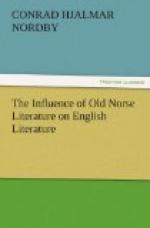Impute it not for sin to me to-day,
If no thought I can shape thereof but this:
O friend, O friend, when thee I meet in bliss,
Wilt thou not give my love Gudrun to me,
Since now indeed thine eyes made clear can see
That I of all the world must love her most?
(P. 368.)
Examples of the gentler scenes are scattered lavishly throughout the poem and it is not necessary to enumerate.
One other sign that the Icelandic sagaman’s art was kin to the English poet’s. The last line of this poem is given thus by Morris:
I did the worst to him I loved the most.
These are the very words of Gudrun in the saga, and summing up as they do her opinion of Kiartan, they stand as a model of that compression which is so admired in our poetry. Many such multum in parvo lines are found in Morris’ poem, and at times they have a beauty that is marvelous. Joined with this quality is the special merit of Morris—picturesqueness, and so the reader often feels, when he has finished a book by Morris, like the Cook tourist after he has “done” a country of Europe—it must be done again and again to give it its due.
Of the other two Old Norse poems in The Earthly Paradise not much need be said. “The Land East of the Sun and West of the Moon” is a fairy tale, in the strain of Morris’ prose romances. It was suggested by Thorpe’s Yule-tide Stories, the tale coming from the Voelundar Saga. There is a witchery about it that makes it pleasant reading in a dreamy hour, but except the names and a few scenes about the farmstead, there is nothing Icelandic about it. The virile element of the best Icelandic literature is wanting here, and the hero’s excuse for leaving weapons at home when he goes to his watch is not at all natural:
Withal
I shall not see
Men-folk belike, but faerie,
And all the arms within the
seas
Should help me naught to deal
with these;
Rather of such love were I
fain
As fell to Sigurd Fafnir’s-bane
When of the dragon’s
heart he ate.
(Vol. II, p. 33.)
This passage is nominally in the same meter as the opening lines of the poem:
In this your land there once
did dwell
A certain carle who lived
full well,
And lacked few things to make
him glad;
And three fair sons this goodman
had.
According to old time English prosody, it is the same, too, as the meter of Scott’s Marmion!
In the passages quoted from “The Lovers of Gudrun” we see a measure called the same as that of Pope’s Essay on Man! Not seldom in “The Lovers” do we forget that the lines are rhymed in twos; indeed, often we do not note the rhyme at all. We are sometimes tempted to think that in this piece, if not in “The Land East of the Sun,” rhyme might have been dispensed with altogether, since it often forces archaic words and expressions into use. But it is to be said generally of Morris’s management of the meter in the Old Norse pieces, that it was adequate to gain his end always, whether that end was to tell an Old Norse story in English, or to carry over an Old Norse spirit into English. Of this second achievement we shall speak further in considering Sigurd the Volsung.




